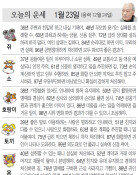Rising living costs amid tackling food price surge
Rising living costs amid tackling food price surge
Posted July. 19, 2023 08:09,
Updated July. 19, 2023 08:09
Living costs are soaring due to surging prices of agricultural products caused by unprecedented extreme rain. Additionally, the potential export ban on grains from Ukraine, one of Europe's largest grain belts, is triggering a wave of agflation globally. The skyrocketing agricultural prices raise fears of reigniting inflation, which had been gradually subsiding.
According to the Korean Ministry of Agriculture, Food and Rural Affairs, the extreme downpour from July 10 to 16 has affected an estimated 27,000 hectares of farms, equivalent to 93 times the size of Yeouido, Seoul's financial hub. The unstable prices of agricultural produce due to recent heat waves have skyrocketed with heavy rainfall. By July 18, wholesale prices of spinach surged by 51% in less than a week and by 219% in a month. Korean lettuce and cabbage prices increased by 195% and 113%, respectively, within a month. This upward trend is expected to persist, considering unaccounted affected farms and the forecast of another heavy downpour posing risks of further flooding this week.
Extreme weather patterns across the world, such as heatwaves and droughts, are driving up global grain prices. In June, global sugar prices reached a 12-year high due to droughts in India and Brazil, two major sugarcane cultivators. Heavy rainfall in Africa led to a 46-year record high price for raw cacao beans. Adding to the situation, Russia announced its withdrawal from the "Black Sea Grain Initiative" on Monday, which allowed grain exports from Ukraine so far despite the war. This potential export ban could contribute to a surge in global food prices, reminiscent of the immediate aftermath of the war in Ukraine as the country accounts for 12% of global maize and 9% of wheat exports, among others.
The price surge in fresh foods, coupled with the rise in imported grain prices, has the potential to impact not only processed foods and dining out but also overall living costs. The slow stabilization of consumer prices may face a resurgence. Core prices, excluding agricultural products and petroleum, notably increased by 3.5% in June. The persistent upward pressure on inflation is further intensified by the anticipated public transportation fee hikes set to begin in August.
If households strongly experience price increases alongside heightened concerns of additional inflation, it can dampen consumer sentiment, thereby delaying much-needed economic recovery. It is crucial to swiftly address any potential price surges to break this detrimental cycle. The government must utilize its emergency reserves extensively to stabilize the supply of agricultural products, livestock, and fisheries. The relevant authorities should also proactively counter potential price-rigging attempts that could undermine stabilization efforts. In the medium to long term, it is essential to intensify efforts in diversifying import channels and enhancing food self-sufficiency in response to the normalization of global agflation.







